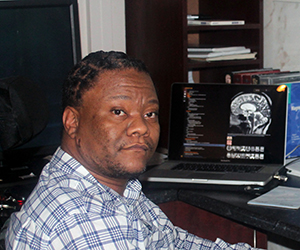Latest News Archive
Please select Category, Year, and then Month to display items
25 March 2024
|
Story Anthony Mthembu
|
Photo Lutendo Mabata
 Prof Nompumelelo Zondi, the newly appointed Vice-Dean: Research and Postgraduate Studies in the Faculty of The Humanities at the University of the Free State (UFS).
Prof Nompumelelo Zondi, the newly appointed Vice-Dean: Research and Postgraduate Studies in the Faculty of The Humanities at the University of the Free State (UFS).
Prof Nompumelelo Zondi has been appointed as Vice-Dean: Research and Postgraduate Studies in the Faculty of The Humanities at the University of the Free State (UFS). Prof Zondi assumed this new role on 1 March 2024 after serving as the Head of Department for African Languages at the University of Pretoria for seven years. “I consider this appointment as an opportunity of growth and learning more about higher education and the Faculty of The Humanities at large,” she said.
Prof Zondi indicates that part of her role is to spearhead the UFS Vision130 within the Faculty of The Humanities, and to ensure that the faculty assists the institution in becoming research-led, student-centred, and globally impactful.
Motivation for assuming this role
One of the primary reasons that led her to consider this role is sharing the knowledge she acquired as part of the Fulbright South African Research Scholar Programme. As a result of that experience and exposure, which went beyond the Ohio State University, she felt it befitting to implement some of the insights she acquired on a bigger scale. Therefore, even though she was impactful in her previous role, Prof Zondi believes that this is an exceptional and more desirable platform to do so. “I feel that I will have easier access to departments within the faculty, while also encouraging and supporting interdepartmental and faculty collaborations,” she explained.
A significant component of Vision 130
He believes that the elements that make up Vision 130 are interrelated. While she considers research central to Vision 130 – as she begins her journey at the UFS, she feels students deserve to be nurtured to further contribute to the university’s impactful research. Thus, student-centredness is the way to go. “I believe that students must be major role players in this Vision130; we must include them in the interactions and discussions that are part of the university’s strategic plan as well as in decision-making processes,” she said. As such, according to Prof Zondi, the more the faculty and the institution care for the students and involve them in Vision130 and in collaborations, the more research outputs the university will achieve.
Quadriplegic doctor obtains degree against all odds
2016-11-25

Dr Swartbooi faces each day with vigour and
resilience. Dr Swartbooi analyses images on
a screen in the Clinical Imaging Laboratory
at Universitas Academic Hospital.
Photo: Oteng Mpete
Life’s defining moments are when perseverance is rewarded. It is not easy to swim against the tide. However, for Dr Ambrotius Swartbooi from the University of the Free State’s Department of Clinical Imaging Sciences, it became his moment of glory. In 2006, Dr Swartbooi suffered a spinal injury from a near-fatal car accident which left him paralysed and a quadriplegic.
The strength to carry on
“You have one of two choices:
to lie down and give up,
or to pick yourself up”
—Dr Swartbooi
Dr Swartbooi spent close to six months, recovering from his injuries. “You have one of two choices: to lie down and give up or to pick yourself up,” said Dr Swartbooi. He would inspire other patients with similar injuries to reintegrate into society despite their new-found circumstances.
Fortunately, not all was doom and gloom; in 2007 Dr Swartbooi got married, and his wife has supported and inspired him to continue pursuing his dreams. Dr Swartbooi completed his undergraduate medical degree at the UFS, and in 2014 decided it was time to complete his studies and pursued an MMed specialising in Diagnostic Radiology.
To treat or not treat: that is the question
After all his trials and tribulations, Dr Swartbooi will be receiving his MMed Diagnostic Radiology degree at the UFS Summer Graduation ceremony in December 2016. His research focuses on intracranial aneurysm size interventions. He discovered that there were discrepancies between international standards for intervention and African standards for intervention.
The research inspects what should be treated and how it should be treated. He found there was a gap in African literature into the size of aneurysms.
Champion of survival: Where to from here?
“That’s a good question,” said Dr Swartbooi. “Slowly from here. I still need to work on getting my full accreditation from the Health Professions Council of South Africa (HPCSA).” He plans to continue fuelling his passion for teaching. “There is no place better to teach than at an academic hospital.”
Dr Swartbooi commended the efforts of the Centre for Universal Access and Disability Support (CUADS), which assisted him in writing all his exams. “I want to be able to make a fulfilling and lasting impact on people but also to give the best medical service that I can,” concluded Dr Swartbooi.